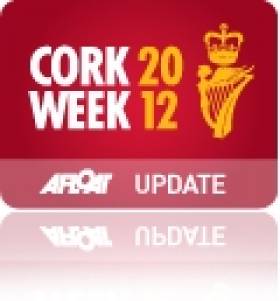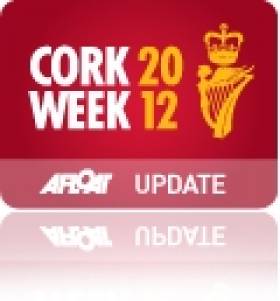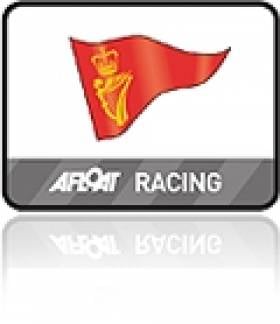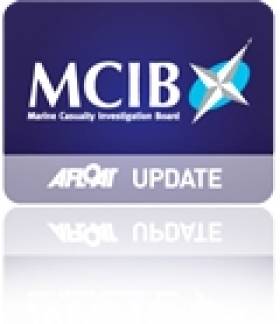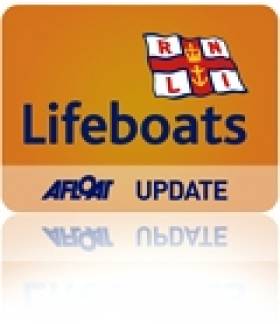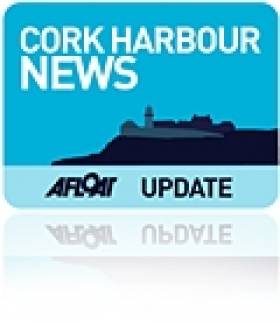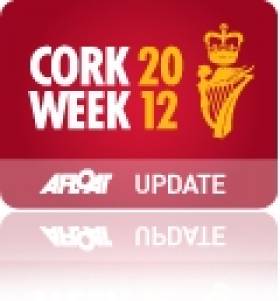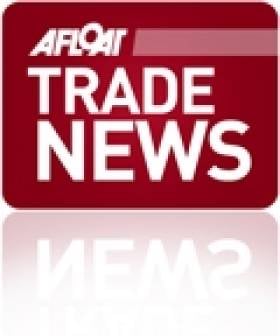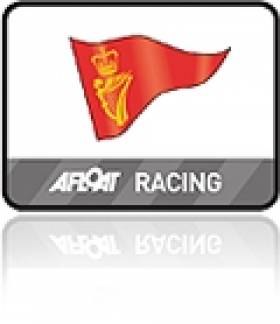Displaying items by tag: Crosshaven
RNLI Lifeboat Launches for Cork Week Yacht
#rnli – Crosshaven RNLI lifeboat were tasked to a collision between two racing yachts, South of Roches Point competing at this afternoon's Cork Week regatta.
The initial information was that one of the yachts was taking on water.
Crosshaven lifeboat quickly launched and headed for the 32' stricken yacht. On arrival, it was clear that no crew on either boat had been injured and that the damage to one yacht, whilst extensive, was above the waterline.
Crosshaven ILB then escorted the damaged yacht back to Crosshaven. Crosshaven Coast Guard and Cork Civil Defence Ribs also attended on scene.
#CORK WEEK – Cork Harbour's international sailing event known as Cork Week which takes place every two years at Royal Cork Yacht Club, has always provided a wealth of shore side activity and this year's event, which takes place in Crosshaven from July 7th to 13th looks like being the most family friendly ever!
An exciting programme of events has been put together including the Under The Sea Marquee, which will host The Whale Workshop on its first ever visit to Cork. Now in his 20th year of operation, Andy Starbuck introduces children to the amazing marine wildlife around our coast. Featuring life size, and lifelike replicas The Whale Workshop explains the spectacular lives of some of our biggest sea creatures and reveals the secretive habits of some of the smaller and lesser-known species.
Our friends at the Oceanworld Aquarium in Dingle will be bringing some of their smallest residents to meet the visitors to All Aboard. With their expertise in sealife, Oceanworld will be using touch pools to give a "hand on" experience.
For those with a competitive streak, Meitheal Mara, the Cork City based Maritime Cultural Organisation will be bringing their Dragon Boats and will give the more adventurous visitors a chance to race these on the river!
There will also be shore based sea-faring challenges, boat building demonstrations and lots of things designed to get the whole family involved.
Also on site will be a host of delicious culinary choices for everyone in the Cork Week 2012 food court.
Be sure you don't miss out on this free admission event taking place in the Royal Cork Yacht Club from 11am – 5pm on Saturday and Sunday the 7th & 8th of July.
As always racing will start Monday the 9th of July and will consist of 5 days of exhilarating competitive racing.
Proudly supported by Cork's 96FM and the Irish Examiner, Cork Week 2012 takes place at the Royal Cork Yacht Club, from July 7th to 13th.
RCYC Hosts 'Moby Dick' Screening
#ROYAL CORK - It was "uncharted waters" for the Royal Cork Yacht Club in Crosshaven last night as it hosted its first ever film screening, a showing of the John Huston classic Moby Dick.
The epic adventure, starring Gregory Peck, was shot on location in nearby Youghal, and tells the story of the obsessed Captain Ahab's pursuit of the titular whale.
Joleen Cronin of the Crosshaven Film Club told the Irish Examiner: "There are lots of people throughout Cork who were involved in the making of the film and it’s a real celebration of movie making and special effects for its time."
The screening is hoped to be the first of many special events at the world's oldest yacht club, which will be hosting the biennial Cork Week regatta from 7-13 July.
Report into Death of Crab Fisherman Prompts Call for Review of Stability Standards
#MCIB - The Marine Casualty Investigation Board (MCIB) has recommended a ministerial review of stability standards for fishing vessels following its report into the death of a crab fisherman off Co Cork in January last year.
Gerry Hegarty drowned after a wave struck the crab boat Carraig An Iasc, which was fully loaded with crab pots at the time, causing it to capsize and sending its two-man crew into the water.
Hegarty, who was not wearing a personal flotation device (PFD) or other buoyancy aid, got into difficulty while attempting to swim ashore with his crewmate and skipper James Fitzgerald, who subsequently raised the alarm.
Lifeboats from Ballycotton and Crosshaven, as well as Irish Coast Guard helicopter Rescue 117, were tasked to the incident. Divers from Naval Service vessel LE Emer located the sunken crab boat but no body was found.
A coastguard search of the area continued over a number of days without success. Hegarty's body was eventually recovered on 17 February 2011 at Ringabella Strand in Co Cork.
The MCIB found it probable that the Carraig An Iasc encountered wind or wave action or a combination of both that caused the vessel to heel to an angle beyond which it was able to recover from its loaded condition. The vessel's Code of Practice Declaration of Compliance was valid until 15 July 2013.
The board noted that there have been "a number of incidents caused by overloading boats thus effecting stability", and recommended that the Minister for Transport reviews and revises the stability standards in the current Code of Practice to improve these standards.
It was also recommended that a safety notice be issued to all skippers and owners in the fishing fleet reminding them of their legal responsibility to ensure that all their crew wear PFDs or lifejackets while on deck.
The full report is available to download as a PDF from the MCIB website HERE.
- Crosshaven
- Cork
- Safety
- Fishing
- Ballycotton
- Lifejacket
- Lifeboat
- Marine Casualty Investigation Board
- Coastguard
- Irish Coast Guard
- Skipper
- naval service
- helicopter
- MCIB
- Rescue 117
- personal flotation device
- Minister for Transport
- LE Emer
- standards
- drowned
- crab fishing
- Carraig An Iasc
- Gerry Hegarty
- James Fitzgerald
- PFD
- Ringabella Strand
- Code of Practice
- stability
- overloading
#RNLI – Crosshaven RNLI lifeboat was tasked at 7.30pm on 6 January to a report of a red distress flare being reported by the control tower at Cork airport. A compass bearing was given which put the incident in the vicinity of the mouth of Cork harbour.
The Atlantic 75 class lifeboat 'Miss Betty" with Alan Venner in command along with fellow volunteers Ian Venner and Vince Fleming searched a large area in seas of 2 metres high between Ringabella and Roches Point. Crosshaven and Guileen Coast Guard units were also tasked to carry out shoreline searches from Roberts Cove in the West to Trabolgan in the East.
All commercial and fishing vessels in the locality were contacted and asked to assist with Radar sweeps of the area. After an intensive search lasting well over 2 hours the lifeboat returned to Station.
Commenting on the incident, Ray Heffernan, Volunteer lifeboat launching authority, believed the dreaded Magic Lanterns were once again to blame. He said " between the RNLI crews on the lifeboat and those manning the station, and the two Coast Guard units searching the shoreline, up to 60 volunteers have had their evening disrupted by the people who wantonly let off these lanterns with no regard for the consequences. Until we are absolutely satisfied that no persons are in danger , we have to keep the search up".
Mystery of Cork's 'Floating Penguins' Revealed
#CORK HARBOUR - Amateur birdwatchers in Cork were in a tizzy last week over the sighting of what appeared to be two penguins floating on an 'ice floe' near Crosshaven, the Cork Independent reports.
The mystery was answered at 'press conference' in popular local haunt Cronin's Bar, where Weitse Buwalda of Salve Marina in Crosshaven – and a friend of Afloat - confirmed that the plastic penguins had been "captured" in the marina before Christmas.
“They were fouling up the place so we shoved them out there on a bit of polystyrene to keep the place clean,” he said with tongue firmly in cheek.
The sightings had sparked much debate among locals, with concerns that the Antarctic avians had broken out of nearby Fota Island Wildlife Park - though this was denied by park officials, who said their full penguin complement was accounted for.
It's the second time in six months that Cork's penguins have gone viral on the internet, following the video of the 'lonely penguin' at Fota Island last July, which shows the little one abandoned by his family at dinner time:
The Cork Independent has more on the story HERE.
Cork Week 2012 Launches New Website
#CORKWEEK – Preparations for Cork Week 2012, one of the biggest and most succesful of Ireland's sailing regattas is well underway and this week the Royal Cork Yacht Club has launched a dedicated Cork Week 2012 website.
The event Chairman, Pat Lyons is keen to welcome all participants to the event.
"Once again, Cork Week will strive to keep down costs for all competitors, right across the board, we realise the importance of this in the current climate. However, we will make sure that the event is a memorable occasion. Next year's event will stage the Cork Week Festival, which will be a celebration of Cork's cultural heritage. Cork has a vibrant and artistic community and the festival will showcase that. We want to make Cork Week a unique experience and this will be expressed through performing arts, local cuisine and exhibitions of the history of the region. You will find bouncy castles and face painting at many events but Cork Week will provide far more than that."
Early expressions of interest have been very promising; a substantial big boat fleet is expected, including several that had a thrilling regatta in 2010. Many of the entries for the 2012 Brewin Dolphin Commodores' Cup are also expected, including some of the best overseas yachts from Europe and further afield, including a strong team from Hong Kong.

Storm - a J109 favourite for Cork Week 2012 - Photo: Bob Bateman
The J/109 Irish National Championship will take place during Cork Week with 20 or more yachts expected from Ireland and overseas. Favourites for the national title include Pat Kelly's Storm, Irish IRC Boat of the Year and Glenn Cahill's Joie de Vivre. Paul Heys of J Boats also reports that the new J/111 class will also be well represented with at least six of the new breed debuting in their first major European Regatta.
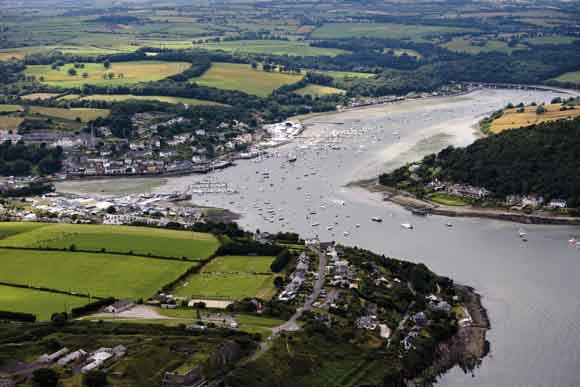
Crosshaven, the venue, as always, for Cork Week 2012 - Photo: Bob Bateman
For the smaller IRC boats, the fleet is set to be just as competitive, the variety of sailing conditions and courses is a great all round test of the yacht and the crew and the yachts in IRC Two and Three make up a substantial percentage of the sailors racing at Cork Week. The committee hopes that the reduction in costs right across the board should be of great benefit to those boats in particular.
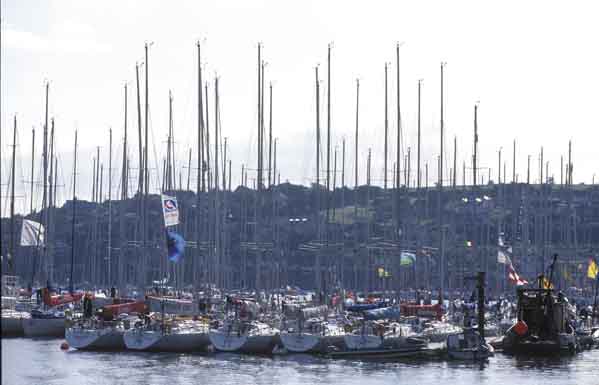
Visitors berthed in Crosshaven for the 2011 event. Photo: Bob Bateman
The 1720 Class has been having a renaissance in Ireland and a large fleet of the exciting yachts is expected. Purpose built for the Cork Week courses, there are 26 1720s in Cork alone and others are expected from abroad. Charter opportunities are available.
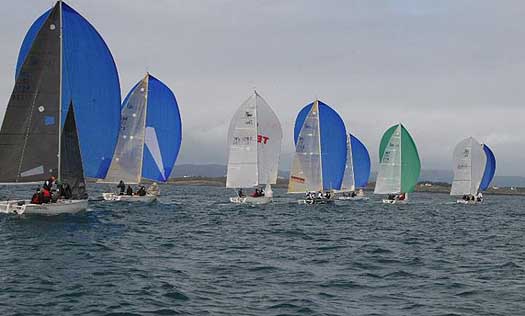
1720s comepting at this year's European Championships in Baltimore
It has also been decided to allow professional sailors to race at Cork Week in any of the classes, as Racing Chairman, Anthony O'Leary explains.
"We don't want to prevent anybody from coming to Cork Week and we have decided to take away any of the barriers to people who want to come and enjoy some wonderful racing. Competitors can expect a variety of courses set in open water, coastal and in the harbour, which should test the crew handling and get just about every sail out of the bag. We are blessed with some superb sailing grounds and we are intent on making full use of them. The focus for Cork Week is the same as it has always been, great sailing and a fabulous atmosphere ashore."
The management team is also keen to encourage participation by charter companies and corporate entries and plans are in place to offer assistance to ensure that Cork Week is a fun-filled regatta for all.
Search for Missing Cork Man Set to Resume
#NEWS UPDATE - The search was set to resume this morning for a missing man feared drowned in Cork city, the Irish Examiner reports.
Search efforts were mounted last night after the man's family notified gardaí. The man, believed to be in his 60s, is thought to have disappeared from Ballincollig Regional Park in the west of the city, where his car and phone were found.
Waterford's Irish Coast Guard helicopter joined the search along with gardaí and the Crosshaven coastguard, concentrating on the River Lee where water levels were high due to heavy rain.
UK Halsey Badge Now on Irish Sails
Sails bearing the UK Halsey badge are appearing from the McWilliam Sail loft in Crosshaven, Co. Cork just two weeks after the announcement that Cork sailmaker Des McWilliam has been appointed head of one of the world's largest sailmaking firms.
He will replace American sailmaker Butch Ulmer - the "U" of UK - who is retiring.
UK-Halsey was founded in City Island, New York in 1946 as Ulmer Sails and now has a network of sail lofts around the world, with 17 in North America, 21 in Europe, 3 in Asia, 4 in Australia, and two in South America. It has a reputation for using the most advanced techniques and technology to build long-lasting and fast sails.
The McWilliam loft in Crosshaven, which has been in business for 40 years, will become the nerve centre for development of the group.
McWilliam will continue to employ six manufacturing and service staff in the Cork harbour premises, including recent recruit Kenneth Rumball, the Irish Fireball dinghy champion.
McWilliam is a prestigious brand name - suits of their sails have equipped competitors in the Admiral's Cup, incorporating the Fastnet, and other international and national yachting events.
The first sail produced in Crosshaven under the new name was a spinnaker for a Dehler 34, followed by a Mermaid jib and a mainsail using the latest Titanium technology for a 50-foot yacht.
"I like the idea that we're sitting here in our old stone watermill in Crosshaven talking about high-grade aerodynamics across the world," McWilliam said, "however, I'm just as happy designing good sails for people who are passionate about getting out in a boat".
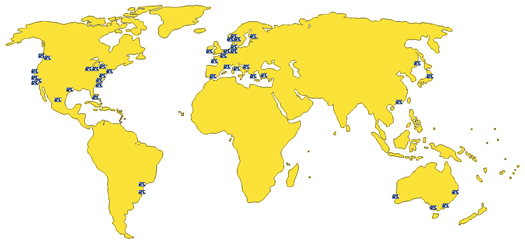
Locations of UK Halsey lofts around the world which are managed from Crosshaven by Des McWilliam
On Board with Jump Juice - Video
#ROYAL CORK – With only two points between Jump Juice (Kerr 37) and Gloves Off (Corby 38) going into the final race of the O'Flynn Exhams Autumn Regatta at Royal Cork YC last weekend, it was all to play for in Cork Harbour. Videographer Brian Carlin jumped from Gloves to Jump to capture the action of the top 2 custom boats in IRC 0 class for the last show down of the 2011 season...


























